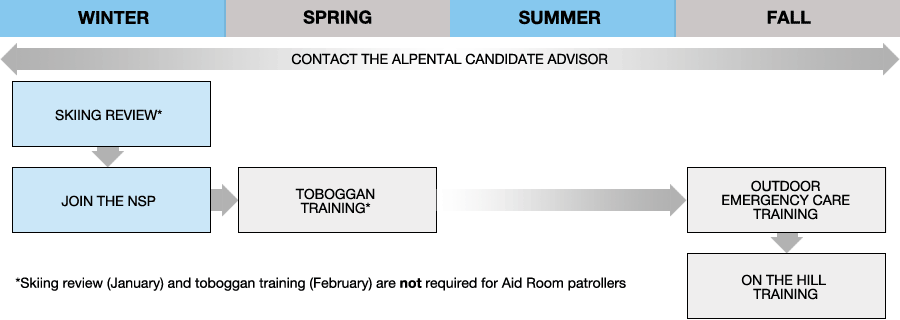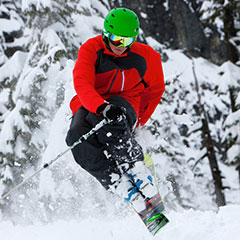Our current 2023-2024 Candidate Class is currently full, but if you're interested in being added to our waitlist for the 2024-2025 season, please feel free to complete our form.
Enjoy skiing, the outdoors, and helping the skiing public? Interested in ski patrolling? Enquire here and an advisor will contact you.
We have immediate openings for our Aid Room Patrol. Aid Room Patrollers must currently work in the medical field such that they see patients on a regular basis (i.e. EMT, firefighter, nurse, physician, etc.) See additional requirements below.
What are we looking for?
The Alpental Ski Patrol is looking for individuals who demonstrate an ability to ski all Alpental terrain under all conditions. This will be determined primarily through the skiing review try out in the spring (except for Aid Room candidates). In addition, all candidates must demonstrate outstanding first aid and personal skills; these will be determined through the training process. Some of the attributes we are seeking and will be assessing during candidate training include:
- Commitment to and enthusiasm for Ski Patrol programs
- Skills necessary to be an effective patroller (first aid, toboggan handling, etc.)
- Willingness to be instructed and trained as a patroller
- Desire to contribute to the Patrol and ski area
- Continued interest (we want you to be part of the program over the long haul)
- Cooperation/compatibility with the skiing public, area personnel and other patrollers
- Ability to work as part of a team, as well as leadership skills
- An attitude of caring and concern for others
Your skills are important, but your attitude and other intangibles are even more important when you are considered for a permanent position as a patroller.
You must be 18 years or older. Alpental does not have a young patroller program at this time.
What is the Process to Join the Alpental Volunteer Ski Patrol?
Below is the basic process to becoming an Alpine Patroller or Aid Room Patroller.

The process to become a candidate first includes an information session and skiing review to see if your skiing or snowboarding ability is strong and confident enough to be able to learn to transport injured persons down the mountain in the toboggans (skiing review for Alpine Patrol candidates only). During the review, we will run you through drills of certain maneuvers on all types of terrain -- sideslip, falling leaf, traverse/kick turns, long- med- short-radius turns, "crud" skiing, bumps, etc. You do not have to be a fast or "pretty skier", but secure and confident. The ski check for folks interested in becoming candidates for the following season is held in the winter.
If you pass the skiing review, or want to be an Aid Room candidate, then you must join the National Ski Patrol before you begin training. Alpine Patrollers take toboggan training in the spring for 4-6 weekends, both days. In the Fall, several courses are required: Outdoor Emergency Care (OEC), AED (Automated Electronic Defibrillator), and CPR for the Professional Rescuer. Together, these take about 90-120 hours over the course of several months. Courses are generally held in the Seattle area. OEC is the National Ski Patrol (NSP) course and no other first aid courses or training can substitute. (Note: if you are an EMT or have extensive first aid training, you may be able to challenge the OEC course.)
Also in the fall, you will need to attend one of the OEC and OTH (on-the-hill) refreshers with the rest of the patrol. The four summit patrols put on shared refreshers for OEC and OTH during which we review a third of the OEC course, and learn and practice avalanche and chairlift evacuation procedures.
When enough snow falls and the area opens, you then review your toboggan training (except Aid Room candidates). Then there is a brief mentoring program for both Alpine and Aid Room candidates to familiarize you with the area and patrol procedures. If you complete and pass all that, you are then accepted as a member of the patrol. You will then be assigned to a duty team and given a team schedule.
What is expected of me as a member of the Alpental Volunteer Ski Patrol?
Patrollers generally are required to work about 16-20 shifts per season, depending on the length of the season (generally 1 shift/week). Shifts for volunteers are Friday night, Saturday, and Sunday. You may also get credit for certain holidays (ML King Day, Presidents Day, over the Christmas-New Years week, etc.). Scheduled team duty days account for about 2/3 of your required shifts, and the rest you choose to work at your convenience. You are allowed to trade duty days so there is flexibility in your Schedule. You are also welcome to work more shifts per season than are required!
In order to remain certified, all patrollers must complete refresher courses in CPR, AED, OEC (first aid), and OTH (on-the-hill) procedures each year. The CPR/AED refresher takes about 3 hours, and the OEC and OTH refreshers are one weekend day each. In addition, patrollers must attend two in-town evening meetings each year — one in the fall and one in the spring. Hill patrollers must also be re-certified on the toboggan each year. This is accomplished during a regular duty day shift early in the season.
What does it cost?
Along with the time commitment, there is also a considerable financial commitment, especially the first year. The costs below are approximate, but best to budget in the neighborhood of $750-$1,000. Discounts on equipment are available through the National Ski Patrol.
- The OEC course with books and materials ($50–$100)
- CPR/AED course ($10)
- You will need a pocket CPR mask ($5)
- When you are officially on the patrol you will need to buy a red jacket for your uniform and your own backpack with first aid supplies ($185-$385, some replacement supplies are provided)
- Helmet ($100)
- NSP/patrol membership dues ($95 annually)
- CPR/AED refresher certification ($10 annually)
- Avalanche transceiver, shovel, avalanche probe, etc. ($300)
- Optional supplies you may want to buy, but are not required to, are: a VHF radio/harness, ropes, sam splint, other medical supplies, etc.
What are the benefits?
Benefits include reduced rate season passes for your dependents, lots of good skiing, social activities, satisfaction in helping, and working with a great group of people who share many of your interests. There is also continuing education available in avalanche, mountain survival, senior level skiing/tobogganing and first aid, etc.
Line cutting is also a benefit, but time saved in line is generally spent stationed at the top of the lift or helping on the hill or in the first aid room.
You also have the opportunity to become a patrol instructor (first aid, CPR, toboggan, avalanche, etc.) or get involved in other ways with the running of the patrol (board member, patrol director, officer, event planner, etc.). We feel you get out of it what you put in. Those that tend to stay with the patrol long term usually get involved in some capacity.
Contact us
So that's the scoop. We think it's all worth it and lots of fun. If you have any other questions about the patrol or want to apply, Please enquire here and an advisor will respond right away.
Types of Patrollers
Alpine or "Hill" Patrol
These are patrollers who are certified to transport a person in a toboggan, trained in first aid, and are obligated to perform most of their patrol duties on the hill. We accept skiers and snowboarders as Hill Patrol candidates.
- Submit your enquiry here
- On the hill tryout (January)
- Toboggan Training (February)
- Complete OEC training (Fall)
- On the Hill Training (Fall)
- AED (Automated Electronic Defibrillator)
- CPR training
- Join the team!
Aid Room Patrol
To be a new First Aid Room Patroller, the candidate must currently work in the medical field such that patients are seen on a regular basis (i.e. EMT, firefighter, nurse, physician, etc.). First Aid Room Patrollers are not certified to run a toboggan and meet their duty obligation by serving primarily in the first aid room. Aid Room patrollers may also perform any patrol duty on the hill except transport toboggans. This is an option for those whose skiing ability or physical condition may prevent them from training on toboggans, or whose interest is primarily in providing first aid care rather than skiing and running toboggans.
- Outdoor Emergency Care (OEC) (Fall)
- AED (Fall)
- CPR for the Professional Rescuer (Fall)
Doctor Patrol or Medical Associate
These are physicians who volunteer with the ski patrol to provide additional medical care as needed. Some of our doctor patrol members also are certified to pull toboggans. For information on the doctor patrol, contact Dr. Ed Pavlin.
Transferring Patroller
- Provide a transfer letter from your old patrol
- Current OEC and current refresher (Fall)
- AED (Fall)
- CPR for the Professional Rescuer (Fall)
- Toboggon Training
Paid "Pro" Ski Patrol Position
View jobs and apply online here.


